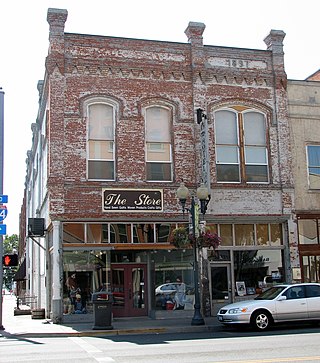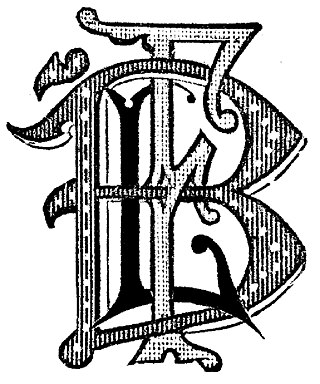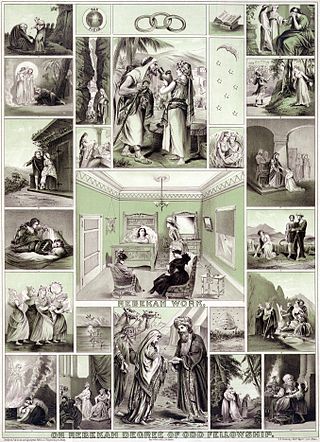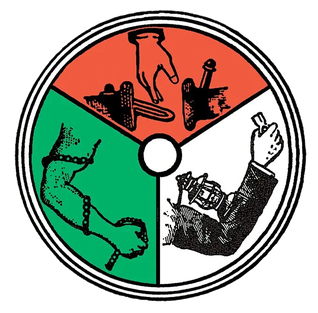
Meadville is a city in and the county seat of Crawford County, Pennsylvania, United States. The population was 13,050 at the 2020 census. The first permanent settlement in Northwestern Pennsylvania, Meadville is within 40 miles (64 km) of Erie and within 90 miles (140 km) of Pittsburgh. It is the principal city of the Meadville micropolitan area, as well as part of the larger Erie–Meadville combined statistical area.

The Independent Order of Odd Fellows (IOOF) is a non-political, non-sectarian international fraternal order of Odd Fellowship. It was founded in 1819 by Thomas Wildey in Baltimore, Maryland, United States. Evolving from the Order of Odd Fellows founded in England during the 18th century, the IOOF was originally chartered by the Independent Order of Oddfellows Manchester Unity in England but has operated as an independent organization since 1842, although it maintains an inter-fraternal relationship with the English Order. The order is also known as the Triple Link Fraternity, referring to the order's "Triple Links" symbol, alluding to its motto "Friendship, Love and Truth".

The Knights of Pythias is a fraternal organization and secret society founded in Washington, D.C., on February 19, 1864. The Knights of Pythias is the first fraternal organization to receive a charter under an act of the United States Congress.

Knights of the Maccabees was a fraternal organization formed in 1878 in London, Ontario, Canada. Most active in the U.S. state of Michigan, the group's fraternal aspects took a backseat to providing low-cost insurance to members. In the society's early years it also provided other final-expense related benefits such as society cemeteries.

The Knights of Honor, was a fraternal order and secret society in the United States in the late 19th and early 20th century. The Knights were one of the most successful fraternal beneficiary societies of its time.

The National Fraternal Order of Police (FOP) is a fraternal organization consisting of sworn law enforcement officers in the United States. It reports a membership of over 355,000 members organized in 2,100 local chapters (lodges), state lodges, and the national Grand Lodge. The organization attempts to improve the working conditions of law enforcement officers and the safety of those they serve through education, legislation, information, community involvement, and employee representation.

The Brotherhood of Locomotive Firemen and Enginemen was a North American railroad fraternal benefit society and trade union in the 19th and 20th centuries. The organization began in 1873 as the Brotherhood of Locomotive Firemen, a mutual benefit society for workers employed as firemen for steam locomotives, before expanding its name in 1907 in acknowledgement that many of its members had been promoted to the job of railroad engineer. Gradually taking on the functions of a trade union over time, in 1969 the B of LF&E merged with three other railway labor organizations to form the United Transportation Union.

A benefit society, fraternal benefit society, fraternal benefit order, friendly society, or mutual aid organization is a voluntary association formed to provide mutual aid, benefit, for instance insurance for relief from sundry difficulties. Such organizations may be formally organized with charters and established customs or may arise ad hoc to meet the unique needs of a particular time and place.
The International Organisation of Good Templars, whose international body is known as Movendi International, is a fraternal organization which is part of the temperance movement, promoting abstinence from alcohol and other drugs.

The Daughters of Rebekah, also known as the Rebekahs and the International Association of Rebekah Assemblies, is an international service-oriented organization and a branch of the Independent Order of Odd Fellows. As the Independent Order of Odd Fellows, the Rebekahs began as an all-white organization, typical at the time, that purported to promote reciprocity and charity, and drew inspiration from Judeo-Christian ethics.
The Atlantic and Great Western Railroad began as three separate railroads: the Erie and New York City Railroad based in Jamestown, New York; the Meadville Railroad based in Meadville, Pennsylvania ; and the Franklin and Warren Railroad based in Franklin Mills, Ohio.
Vasa Order of America is a Swedish-American fraternal, cultural and educational organization. The organization seeks to benefit its members by sharing Swedish and Scandinavian culture and heritage.

The Ancient Order of United Workmen (AOUW) was a fraternal organization in the United States and Canada, providing mutual social and financial support after the American Civil War. It was the first of the "fraternal benefit societies", organizations that would offer insurance as well as sickness, accident, death and burial policies. It dissolved in 1952.

The Supreme Council of the Royal Arcanum, commonly known simply as the Royal Arcanum, is a fraternal benefit society founded in 1877 in Boston, Massachusetts by John A. Cummings and Darius Wilson, who had previously been among the founders of the Knights of Honor, a similar organization, in Kentucky. The Royal Arcanum home office is located in Boston, Massachusetts.

The Brotherhood Railway Carmen of America, commonly known as the Brotherhood of Railway Carmen (BRC), was a fraternal benefit society and trade union established in the United States of America. The BRC united railroad employees involved in the repair and inspection of railroad cars to advance their common interests in the realm of hours of work, wages, and working conditions.

The Order of Railway Conductors of America (ORC) was a labor union that represented train conductors in the United States. It has its origins in the Conductors Union founded in 1868. Later it extended membership to brakemen. In 1969 the ORC merged with three other unions to form the United Transportation Union.

The Degree of Honor Protective Association is a fraternal benefit society. It was originally organized as a female auxiliary to the Ancient Order of United Workmen, but split off in 1910 to become its own independent group. It merged with Catholic Financial Life in 2017.
Grand United Order of Oddfellows Friendly Society (GUOOFS) is an odd fellows grand lodge founded in 1798 and based in Manchester, England.















